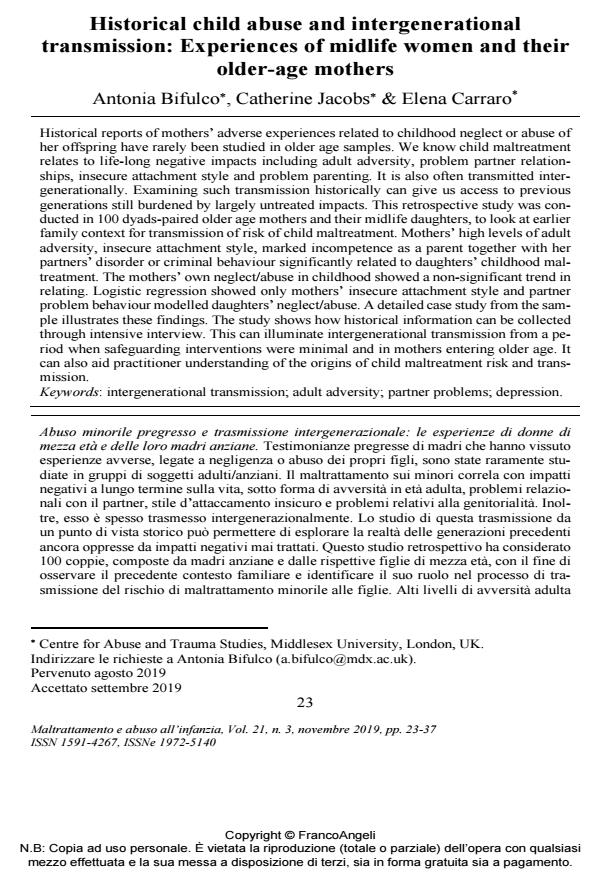Historical child abuse and intergenerational transmission: Experiences of midlife women and their older-age mothers
Titolo Rivista MALTRATTAMENTO E ABUSO ALL’INFANZIA
Autori/Curatori Antonia Bifulco, Catherine Jacobs, Elena Carraro
Anno di pubblicazione 2019 Fascicolo 2019/3
Lingua Inglese Numero pagine 15 P. 23-37 Dimensione file 319 KB
DOI 10.3280/MAL2019-003003
Il DOI è il codice a barre della proprietà intellettuale: per saperne di più
clicca qui
Qui sotto puoi vedere in anteprima la prima pagina di questo articolo.
Se questo articolo ti interessa, lo puoi acquistare (e scaricare in formato pdf) seguendo le facili indicazioni per acquistare il download credit. Acquista Download Credits per scaricare questo Articolo in formato PDF

FrancoAngeli è membro della Publishers International Linking Association, Inc (PILA), associazione indipendente e non profit per facilitare (attraverso i servizi tecnologici implementati da CrossRef.org) l’accesso degli studiosi ai contenuti digitali nelle pubblicazioni professionali e scientifiche.
Historical reports of mothers’ adverse experiences related to childhood neglect or abuse of her offspring have rarely been studied in older age samples. We know child maltreatment relates to life-long negative impacts including adult adversity, problem partner relationships, insecure attachment style and problem parenting. It is also often transmitted inter-generationally. Examining such transmission historically can give us access to previous generations still burdened by largely untreated impacts. This retrospective study was conducted in 100 dyads-paired older age mothers and their midlife daughters, to look at earlier family context for transmission of risk of child maltreatment. Mothers’ high levels of adult adversity, insecure attachment style, marked incompetence as a parent together with her partners’ disorder or criminal behaviour significantly related to daughters’ childhood maltreatment. The mothers’ own neglect/abuse in childhood showed a non-significant trend in relating. Logistic regression showed only mothers’ insecure attachment style and partner problem behaviour modelled daughters’ neglect/abuse. A detailed case study from the sample illustrates these findings. The study shows how historical information can be collected through intensive interview. This can illuminate intergenerational transmission from a period when safeguarding interventions were minimal and in mothers entering older age. It can also aid practitioner understanding of the origins of child maltreatment risk and transmission.
Testimonianze pregresse di madri che hanno vissuto esperienze avverse, legate a negligenza o abuso dei propri figli, sono state raramente studiate in gruppi di soggetti adulti/anziani. Il maltrattamento sui minori correla con impatti negativi a lungo termine sulla vita, sotto forma di avversità in età adulta, problemi relazionali con il partner, stile d’attaccamento insicuro e problemi relativi alla genitorialità. Inoltre, esso è spesso trasmesso intergenerazionalmente. Lo studio di questa trasmissione da un punto di vista storico può permettere di esplorare la realtà delle generazioni precedenti ancora oppresse da impatti negativi mai trattati. Questo studio retrospettivo ha considerato 100 coppie, composte da madri anziane e dalle rispettive figlie di mezza età, con il fine di osservare il precedente contesto familiare e identificare il suo ruolo nel processo di trasmissione del rischio di maltrattamento minorile alle figlie. Alti livelli di avversità adulta della madre, stile d’attaccamento insicuro, marcata incompetenza genitoriale, in aggiunta a disturbi o comportamenti criminali del partner correlano significativamente con il maltrattamento delle figlie durante l’infanzia. È, inoltre, emersa una tendenza non significativa che collega la negligenza e l’abuso delle madri stesse durante la loro infanzia con il maltrattamento delle figlie. L’analisi di regressione logistica ha identificato lo stile d‘attaccamento insicuro e i com-portamenti problematici del partner come gli unici fattori che influiscono su negligenza/abuso delle figlie. Queste conclusioni sono illustrate attraverso un dettagliato caso di studio tratto dal campione. Lo studio suggerisce che è possibile raccogliere informazioni storiche tramite l’utilizzo di un’intervista approfondita. Ciò può rendere più chiara la trasmissione intergenerazionale da un periodo in cui gli interventi di tutela erano minimi e in madri che entrano in età avanzata. Può, inoltre, aiutare gli operatori a comprendere le origini del rischio e della trasmissione del maltrattamento sui minori.
Parole chiave:Trasmissione intergenerazionale; trauma nell’infanzia; trauma e avversità in età adul-ta; depressione.
Antonia Bifulco, Catherine Jacobs, Elena Carraro, Historical child abuse and intergenerational transmission: Experiences of midlife women and their older-age mothers in "MALTRATTAMENTO E ABUSO ALL’INFANZIA" 3/2019, pp 23-37, DOI: 10.3280/MAL2019-003003